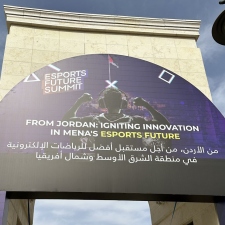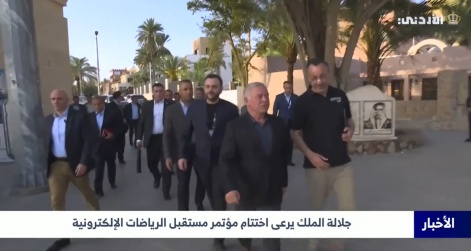Last week saw an ambitious roadshow for Jordan’s esports industry. The “north to south” festival of esports and games welcomed gamers and industry professionals from across the region, with stages in Umm Qais in the north, going through Amman, then historic Petra, and ending with the grand finale in Aqaba on the south coast at the weekend.
PocketGamer.biz’s regular collaborators in the MENA region, the KAFD, Jordan Gaming Lab, and developer Maysalward played a pivotal role in hosting the events. Led by Nour Khrais and his team, they were instrumental in making the roadshow a success. The esports partner was ibMedia, led by Frank Sliwka.
The final two days in Aqaba, known as the Esports Future Summit, were marked by the presence of many regional and international speakers. The event was graced by the attendance of His Majesty King Abdullah II, His Royal Highness Prince Omar bin Faisal, and His Excellency Ahmad Hanandeh, Minister of Digital Economy and Entrepreneurship. Their presence resulted in widespread coverage in the Arabic media, with the content, including tournaments for games like Valorant and Street Fighter 6, being streamed to over six million people.
“This summit is about connecting culture with technology,” announced Nour Khrais in his introduction, “which I believe is something ‘pure Jordan’.”
Exhibitors included Jordan Gaming Lab, Tamatem, Jordan Esports Federation, Koala 4D, Desert Fox Racing, esports team Fate, Dimensions, the Hackathon Integrity & Anti-Corruption Commission, Al Hussein Technical University, newly-formed Eshi Games and sponsors Zain and Aqaba Development Corporation.
There were dozens of expert speakers, including Laylah Bulman (Minecraft), Mohammed Kanakri (JEG), Mohammad Majali (Fate Esports), Jassem Osseiran (611 Capital), Lance Mudd (Samurai AI) and loads more.
So what did we learn?
1/ The Middle East and North African region is already a significant force in global games
The MENA region is the fastest-growing market in games, and His Royal Highness Prince Omar bin Faisal stressed that the MENA region already accounts for a significant portion of the global esports market (56%).

Jordan itself has a large number of players and a young population (63% are under 30), which presents enormous opportunities for esports development.
Established in 2019, the Jordan Esports Federation has grown rapidly and gained international recognition. Jordan’s esports teams have achieved notable results, like recently reaching the Asian Cup finals in e-football.
2/ Jordan has an ambitious plan for investment in games and esports
His Royal Highness Prince Omar bin Faisal told the audience, “We stand on the cusp of a transformative era for esports.” He explained that Jordan is “deeply committed to realising the potential of esports both in Jordan and abroad.”
Jordan will create 3,000 games-related jobs and ensure esports contributes 1% to GDP within five years
Jordan’s five-year government plan is to become MENA’s esports powerhouse. The kingdom plans to create 3,000 sector-related jobs and ensure that esports contributes 1% to GDP in the next five years.
Backed by the Jordan Olympic Committee, the region plans to promote games and esports as a credible career path. The prince stressed the importance of educating parents so that they understand the professional opportunities students have in games.
The strategy targets training 1,500 players, coaches and referees and increasing national team tournament participation by 50%. An advisory committee headed by the prince has been formed to oversee the implementation of the esports strategy in partnership with the private sector and esports federation.
3/ Investors traditionally don’t like esports
Jassem Osseiran of investors 611 Capital delivered Sunday’s opening lecture. Exaggerating for effect, he started by telling the crowd that investors hate esports. Unpredictable trends, competitive markets, difficult monetisation, high risk, and too much hype, are all challenges. The money flow in the esports ecosystem is complex.
But he went on to explain how teams, studios, and service providers looking for funding should pitch to investors. The focus is on telling the individual story: “Why are you in this space? What is your business plan? Most investors, especially in an emerging market, don’t really know how to justify putting money into something new, but they can understand and put their trust in a person.”

When pitching to investors, entrepreneurs should focus on their personal background – who they are, their passion and position in the overall games ecosystem. Being genuine and human is key. Investors are looking for fresh IP, clear function and strong culture. “71% of culture pioneers agree that the story you tell around an investment is just as important as the final product,” explained Osseiran. “The challenges of owning an esports business are the same as owning a potato farm – you still need to tell your story; why are you doing this?”
Anything that enhances the overall ecosystem is of interest to investors. Entrepreneurs should clearly explain the market opportunity, their unique strengths, business model, financial projections (conservative estimates, showing risks), and funding needs. Overall, his key message is that in early-stage investing, especially in emerging industries like esports, the personal story, passion and capabilities of the entrepreneur are paramount.
Studies show gaming improves cognitive skills, problem-solving, language learning, teamwork and leadership
4/ Esports fans are not who you think
Mohammed Kanakri (JEG) took to the stage to talk about the many myths of esports. Esports has grown rapidly, with the global gaming market worth billions – it’s not just a sideshow for kids.
The average esports fan is 26 years old. The stereotype of the unhealthy, basement-dwelling gamer is out of date. Studies show gaming improves cognitive skills, problem-solving, language learning, teamwork and leadership.
Kanakri was keen to stress that there is no proven link between esports and real-world violence. If anything, games provide a healthy outlet.
5/ 90% of jobs will require digital literacy skills (and you can acquire those from games)
One keynote speaker at the Aqaba event was Laylah Bulman, boss of Minecraft Education. She spoke about the urgent need for digital literacy and computer skills and posed the question, “How will you learn them?” The answer is: inside games, and from an early age.

“The only passport that matters is your education,” she said. “It goes with you everywhere.” Bulman spoke at length about the role games like Minecraft continue to play in education. “Minecraft esports is a path to professions beyond the game,” she said.
Bulman went on to Amman after the conference to meet students at Al Hussein Technical University in person.
6/ Artificial intelligence is a huge topic in the Middle East, as it is everywhere
No games industry conversation goes on for long without AI being mentioned. However, Lance Mudd (Samurai Labs) explained that large language model AIs are mostly English at the moment, although this is changing.
Samurai Labs is an Artificial Intelligence company dedicated to proactively detecting and preventing online violence. Mudd revealed, “It can take four to six weeks for Samurai to train on a local language; we start with English and then it takes time to train. It is our biggest thorn, not being able to serve the entire community of our partners – AI still has a long way to go. Luckily, there are a lot of people communicating in games and esports, so the models are training themselves to be better.”

Conversations continued along the theme of AI, as well as the rise of no-code and low-code building and the democratisation of game design with today’s tools.
“Become a good friend with AI,” urged organiser Nour Khrais. “Focus less on the technical side and put more on the creative side. It’s no longer essential to be good at coding or to know 3D or 2D design. But you will need to put uniqueness into your product.”
7/ Aqaba and Jordan are soon to become a new hub of internet connectivity
Google’s new Blue-Raman fibre-optic cable system, designed to connect Europe to Asia, will come ashore in Jordan at Aqaba. First announced in 2021, it’s being developed by Google and Telecom Italia Sparkle in partnership with several other telecom companies.

Terrestrial fibre will connect Aqaba to a new internet hub: the Aqaba Digital Hub (ADH). ADH is a huge new project that will function as a data centre and internet exchange. It should all be in place by the end of this year and provide new opportunities for business in the region.
You can join Pocket Gamer Connects at the Dead Sea in Jordan this year for a two-day games industry conference on November 9-10.






















